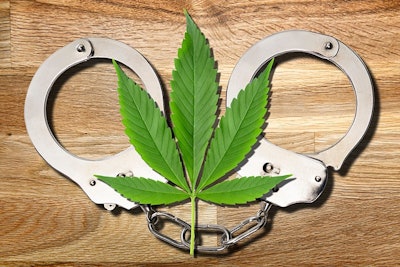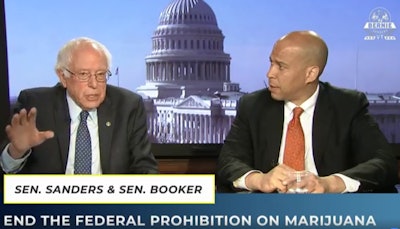

“While some aspects of the issue are complicated, some are not,” Sanders said April 19 in a Facebook Live video with U.S. Sen. Cory Booker, the original sponsor of the Marijuana Justice Act. “Nobody I know thinks that it makes any sense at all that under the Federal Controlled Substances Act you have marijuana—marijuana is a Schedule-I drug alongside of heroin, which is a killer drug.”
So, what is it?
The Marijuana Justice Act would achieve several elements of the same broad goal: to legalize cannabis at the federal level, full-stop.
Marijuana would be removed from the Schedule of Controlled Substances, effectively rendering it open to commerce and research under certain federal regulations.
But Booker has been adamant that this bill must achieve certain social justice goals: Much of the bill’s text is spent outlining what it means for a state to have a disproportionate arrest rate and a disproportionate incarceration rate. When “the percentage of minority individuals arrested for a marijuana related offense in a State is higher than the percentage of the non-minority individual population of the State, as determined by the most recent census data,” the Marijuana Justice Act would eliminate federal funding for prison construction and staffing.
Punitive measures, Booker says, must be used to course-correct the country’s uneven stance on marijuana.
“Our country’s drug laws are badly broken and need to be fixed,” Booker said in a public statement when he introduced the bill in August 2017. “They don’t make our communities any safer—instead, they divert critical resources from fighting violent crimes, tear families apart, unfairly impact low-income communities and communities of color and waste billions in taxpayer dollars each year.”
Who is sponsoring this?
Along with Booker, co-sponsors include: Sanders, U.S. Sen. Ron Wyden and U.S. Sen. Kirsten Gillibrand.
In the House, co-sponsors include: U.S. Reps. Ro Khanna (D-CA), Sheila Lee Jackson (D-TX), Steve Cohen (D-TN), Eleanor Holmes Norton (D-DC), Bobby L. Rush (D-IL), Earl Blumenauer (D-OR), Danny K. Davis (D-IL), Jared Polis (D-CO), Hakeem S. Jeffries (D-NY), Pramila Jayapal (D-WA), Yvette Clarke (D-NY), Marcia Fudge (D-OH), Donald M. Payne Kr. (D-NJ), Bennie G. Thompson (D-MS), Frederica S. Wilson (D-FL), Mark Pocan (D-WI), Tulsi Gabbard (D-HI), Jamie Raskin (D-MD), Raul M. Grijalva (D-AZ), Jared Huffman (D-CA), Jerry McNerney (D-CA), Luis J. Correa (D-CA), Joseph Crowley (D-NY), Donald S. Beyer (D-VA), Carolyn B. Maloney (D-NY), Alan S. Lowenthal (D-CA), Gregory W. Meeks (D-NY).
Is this bill getting any traction in Congress?
Well, no. The bill was introduced in the Senate on Aug. 1, 2017. According to congress.gov, nothing has happened since then.
The same goes for the House bill, which was introduced Jan. 17, 2018.
Onward to 2020?
In the background of this bill lies 2020 presidential campaign speculation. Booker, Sanders and Gillibrand have been bandied about as names we may see on the Democratic primary that year. Marijuana reform, without a doubt, is becoming more visible platform in political campaigns within both major parties. Democrats, as evidenced by the co-sponsor list here, are taking the conversation a step further by including civil rights language.
"Leaders in the Democratic Party are increasingly recognizing that leading the charge on legalization is not only good policy, but good politics," Justin Strekal, political director of NORML, told Forbes. "The constituencies which the party claims to stand for are the ones who have most felt the weight of prohibition and the lifelong consequences of prohibition."
Top photo courtesy of Adobe Stock


























